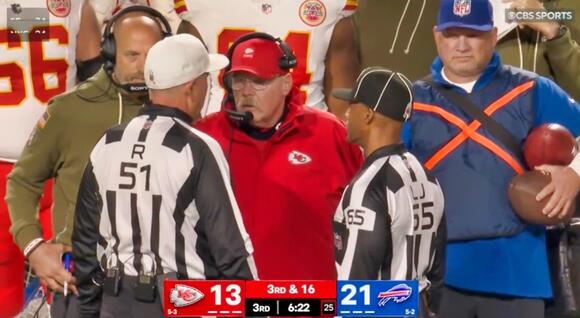The high-stakes showdown between the Buffalo Bills and the Kansas City Chiefs, one of the most intense rivalries in the NFL, concluded in a shocking victory for the Bills—but the focus has quickly shifted from the scoreboard to the officiating crew. A full-blown scandal is now erupting, with social media ablaze with accusations that the entire game was “rigged” after a single, pivotal penalty call flipped the entire outcome late in the contest.
The controversy centers on a penalty—or, depending on who you ask, a non-call—in a critical, game-defining sequence. While the precise details of the play are still being endlessly debated and replayed, the result was unambiguous: a flag thrown by the crew, led by referee Shawn Hochuli, nullified a crucial Chiefs offensive play that appeared destined for a go-ahead score.
The immediate reaction from the players on the field and the millions watching at home was one of absolute fury. The call, widely deemed questionable by former officials and analysts alike, was viewed as a direct intervention that stole momentum and, ultimately, the victory from Kansas City.
The Call That Silenced Millions
The outrage is palpable because, in a game decided by a razor-thin margin, this particular penalty was the clear inflection point. Chiefs fans are furious, pointing to what they see as a consistent pattern of officiating bias against their team in crucial situations. The sentiment online is harsh, with the hashtag “#NFLRigged” trending globally within minutes of the final whistle. The accusations are not just about poor judgment; they are whispers of favoritism and hidden agendas designed to manipulate the final result.
Fans point to the seemingly relentless stream of flags thrown by Hochuli’s crew throughout the game—a crew already known for ranking among the league leaders in penalties called. For a matchup involving two of the league’s most popular teams, the constant interruptions and highly questionable interpretations of the rulebook only fueled the narrative that the officials, intentionally or not, were making the game about themselves.
A Legend Demands Investigation

The simmering resentment boiled over when a Kansas City legend stepped into the fray. Tony Gonzalez, the Hall of Fame tight end, openly demanded that the NFL launch a formal investigation into referee Shawn Hochuli and his crew. Gonzalez, known for his calm demeanor and measured commentary, expressed disbelief that a penalty of that magnitude could be called so late in such a close, meaningful game, suggesting the call was “unwarranted” and “silenced millions of fans.”
Gonzalez’s condemnation lent unprecedented credibility to the “rigged” narrative. When a respected figure with no current ties to the team publicly calls for a league investigation into a head official, the controversy moves beyond simple fan griping and lands squarely at the door of the NFL Commissioner’s office.
Bias, Agendas, and a Looming Scandal
The allegations against Shawn Hochuli are not new; various fan bases have previously pointed to seemingly disproportionate penalty counts and eccentric ruling styles whenever his crew officiates their games. The Bills-Chiefs debacle, however, has amplified these concerns to a national crisis point. The sheer impact of the single, controversial flag—which essentially eliminated the Chiefs’ chance for a final, winning drive—has created an environment where belief in an intentional manipulation of the game is running rampant.
Whispers suggest that the league office must now grapple with the specter of the biggest referee scandal of the season. At stake is far more than a single game result; the very integrity of the NFL is being questioned. The league faces intense pressure to not only explain the penalty but also address the deeper, systemic concerns about officiating consistency, bias, and accountability. Fans are demanding clarity and transparency, and until a credible, exhaustive investigation is announced, the shadow of a “rigged” result will loom large over one of the most exciting rivalries in professional sports.
